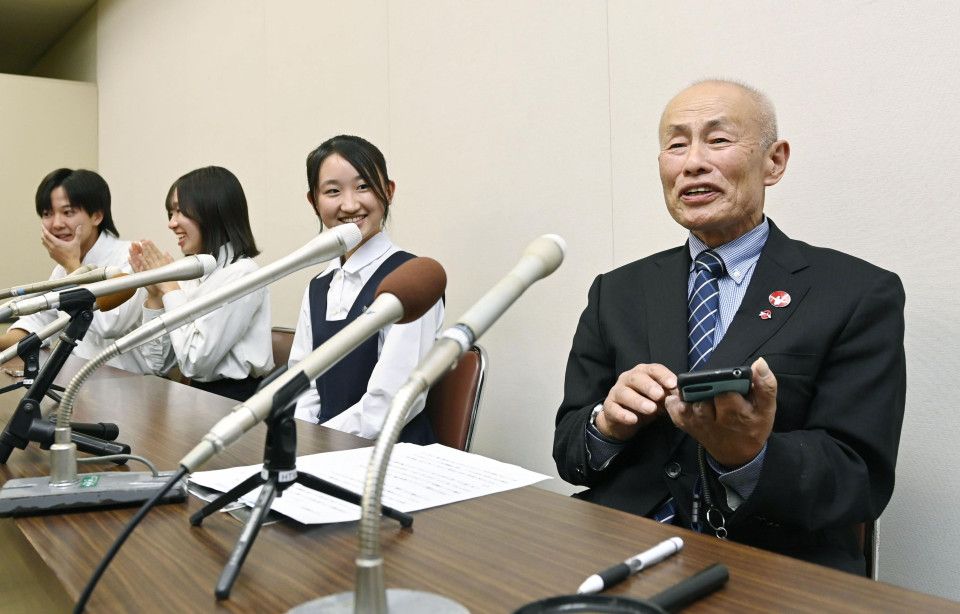
Japan’s leading atomic bomb survivors’ organization, Nihon Hidankyo, has won the 2024 Nobel Peace Prize, marking a milestone for the group that has campaigned for years for the abolition of nuclear weapons.
The group, founded in 1956, received the prize “for their efforts to achieve a world free of nuclear weapons and for demonstrating through witness testimony that nuclear weapons should never be used again,” the Norwegian Nobel Committee stated.
It is the second time a Japanese person or organization has received the Nobel Peace Prize since 1974, when it was awarded to former Prime Minister Eisaku Sato, who introduced Japan’s three non-nuclear principles of not possessing, producing or permitting nuclear weapons in its country. territory.
“The extraordinary efforts of Nihon Hidankyo and other hibakusha representatives have greatly contributed to the establishment of the nuclear taboo. “It is therefore alarming that today this taboo against the use of nuclear weapons is under pressure,” the committee added.
Russia has threatened to use nuclear weapons since it began its invasion of Ukraine in February 2022, while fears have intensified amid the growing confrontation between Israel, a nuclear state, and Iran, which has been working on developing such weapons capacity.
Meanwhile, momentum toward nuclear weapons abolition has stalled in recent years, as member parties at the Nuclear Non-Proliferation Treaty review conference failed to adopt a report in 2022 due to opposition from Russia, the second time in a row since 2015.
“Please abolish nuclear weapons while we are alive,” said Toshiyuki Mimaki, head of the Confederation of Organizations of People Affected by the Atomic Bomb of Hiroshima Prefecture, after the announcement.
The US bombings of Hiroshima on August 6, 1945, and Nagasaki three days later are estimated to have killed an estimated 210,000 people by the end of that year. Japan surrendered six days after the bombing of Nagasaki, ending World War II.
Until the formation of Hidankyo, atomic bomb survivors, or hibakusha in Japanese, had lived largely in silence, struggling with health problems, poverty and social discrimination in Japan.
“I can imagine the faces of my predecessors, who wished that an incident leading to the creation of hibakusha would never occur again,” said Sueichi Kido, the group’s general secretary, referring to the victory.
“I think they would look honestly at the long years we have been fighting,” he added.
The hibakusha were encouraged to rise up when anti-nuclear sentiment was reignited among the public following a US hydrogen bomb test at Bikini Atoll in the Marshall Islands in 1954, which exposed local people and ship crew Japanese tuna boat to radioactive fallout.

As part of the organization, atomic bomb survivors began campaigning to change the status quo, setting themselves two main goals: the abolition of nuclear weapons and obtaining state compensation for the damage caused by the bombing.
Their activities have led to the enactment of laws to provide medical and other assistance to survivors.
Hidankyo has also sent survivors to speak in various countries and at international events about the devastating consequences of atomic weapons in an attempt to promote a world free of nuclear weapons.
Japanese Prime Minister Shigeru Ishiba stated: “It is extremely significant that the prize is awarded to a group that has dedicated many years to the abolition of nuclear weapons.”
In 2017, the International Campaign to Abolish Nuclear Weapons, or ICAN, received the peace prize for its efforts leading to the adoption of the UN treaty banning nuclear weapons.

Source: https://reporteasia.com/sociedad/2024/10/11/el-grupo-japones-de-supervivientes-de-la-bomba-atomica-gana-el-premio-nobel-de-la-paz/

